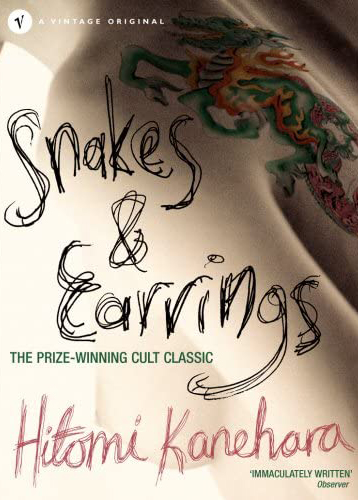

Snakes and Earrings seems inseparable from the media spectacle that followed it winning the prestigious Akutagawa Prize. Kanehara, 20 at the time, and her co-winner, became the youngest writers ever to win the award, and Snakes and Earrings became a bestseller.
The book gained notoriety for offering an insight into youth subculture via the story of Lui, a 19 year old girl who enters the world of body modifications and gets involved with two violent young men. But the media also latched onto the author, paralleling her personal life with that of the book’s main character, commenting on the mini skirt and contact lenses she wore to the award ceremony, turning her into a pop star and questioning whether the book merits the award or whether Kanehara, a pretty young woman writing about scandalous topics, was awarded as a marketing ploy to revive the declining literary market in Japan.
Academics have noted how she simultaneously became a symbol of both high culture, subculture and “troubled” youth culture, a barometer of change, and an embodiment of everything supposedly wrong with them. My copy of the book boasts it as a “cult classic” despite the fact that it was printed only a year after its release (too early to be a classic) and a bestseller (too popular to be cult).
Snakes and Earrings is neither a pure marketing fad with zero literary value nor a literary masterpiece worthy of highest acclaim. It’s a book written by a teenager - a very solid book by a teenager, but still a book by a teenager.
It uses the body to convey the protagonist’s lack of purpose and the attempts to replace it, and it offers interesting commentary on the impotence of subculture. Lui occasionally works as a hostess at parties for elite businessmen, “playing the part of a pleasant, polite Japanese girl” and she revels in the expectation of the day when her body modifications will be so visible she will no longer be able to pass as a traditional, docile girl.
Year of publication:
2004
Country of publication:
Japan
Page count:
124
English translation:
Yes
Would I recommend this book?
No lol
However, there is no relief from gender roles in the body modification scene. She acts as a stay at home girlfriend to her boyfriend, who is violently possessive of her, and her lover is a sadist who gets off on the idea of killing her.
The prose is simplistic, often resorting to cliches. The story is short, fast and very dramatic, and the symbolism is anything but subtle. But that’s not necessarily a drawback - after all, what captures the essence of being a teenager more authentically than being cool, dramatic and a little bit dumb?
The author said she just wanted to tell a personal story, but she’s celebrated for inadvertently capturing a zeitgeist of a whole generation. These are not the cutesy and flattering teenagers from American YA; Kanehara’s characters are nihilistic, (self) destructive and desperately trying to fill an existential void.
The portrayal of bisexuality in Snakes and Earrings is also a product of its time. It treats bisexuality in a similar way as 2000s emo did: as a symbol or a performance intended to communicate edginess and sex appeal to the right audience and to outrage everyone else.
One of the three main characters is bisexual - the first time we meet him the narrator informs us that he’s “totally crazy” and his bisexuality is discussed in the same breath as his sadism (Lui finds both appealing, and imagines him having sex with her boyfriend). It seems like these are all connected: his bisexuality and sadism are a part of him being this cool, “crazy” subcultural guy, but they also end up translating to him being violent and backstabbing.
He doesn’t use the word bisexual, it’s only used in a criminal context, by the police when Lui’s boyfriend is found dead, his body showing signs of both physical and sexual violence. The police asks her if he had any “bisexual tendencies”, because they somehow assume that only queer men get raped by men. Lui, who earlier found the fantasy of her two lovers hooking up appealing, is outraged when confronted with the idea that her boyfriend might have actually been bisexual, and categorically denies it because he wasn’t “a sexual deviant” and even if he was bisexual “he would be the butch one” and wouldn’t have “let” himself get raped.
Of course it turns out that Lui’s boyfriend was raped and killed by her bisexual lover because he wanted her for himself. True to her self destructive impulses she moves in with him, covers up the crime for him and starts moulding herself to his tastes.
I can’t even bring myself to be particularly outraged by the treatment of bisexuality - it’s an edgy book from the 2000s and all of the main characters are violent and troubled in one way or another. However, if you’re looking for a clever, nuanced portrayal of bisexuality, Snakes and Earrings is not the book for you.
